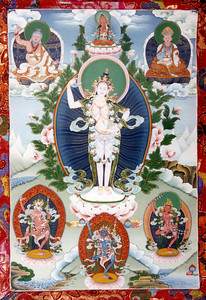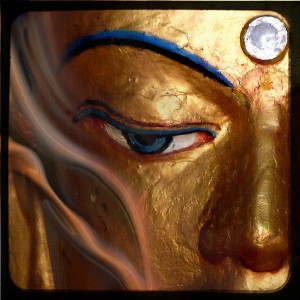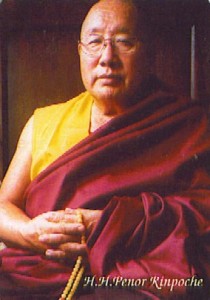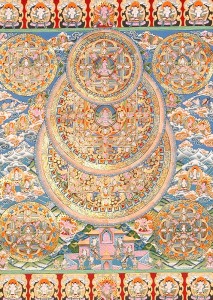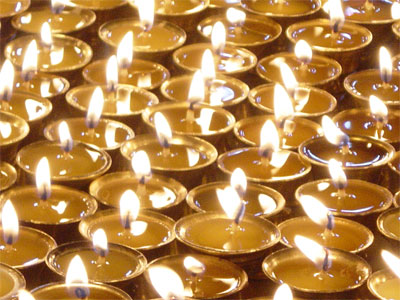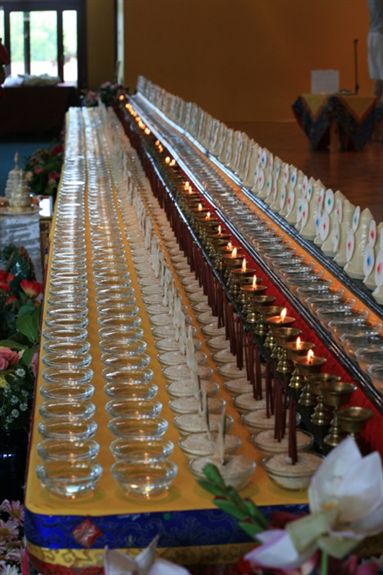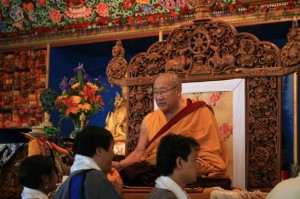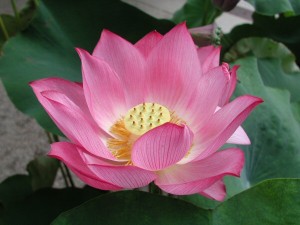An excerpt from the Mindfulness workshop given by Jetsunma Ahkon Lhamo in 1999
Do you ever sense that there is a thickness in your mind, almost like pudding? We can’t break through it. It’s like we go through these sleepwalking motions, and you lose days, hours, years. You just lose time, and that thickness is because we already decided, way back somewhere else, that one of the goals in life was to get such-and-such, and in order to get such-and-such, we have to act thus-and-so. Once we decide that, we never think about it again, not really. We never stop to reevaluate. That is the unique thing about our brains. It’s something we really need to understand. Once you come to a conclusion and you conceptualize something, that’s it. You act by rote afterwards. You have to break through that.
In order to really give rise to true compassion, one has to recognize the faults of cyclic existence, and be in a state of recognition. In order to awaken to a state of recognition, to begin that process of discrimination, you have to rouse your mind from going through these preset patterns which are based on deluded ideas that you were given somewhere early on that you’ve never bothered to change. If you don’t change those, you will still try to attain the same type of goals, but you’ll be wearing Dharma clothes and doing Dharma activities when you do it. If you got the message that you have to be a star, be powerful, be smarter, or be some kind of special person, then when you practice Dharma, if you don’t go back and reevaluate that in a mindful and discriminating way, you will simply do the same thing with Dharma clothes on, with Dharma words in your mouth. Basically what we’re doing there is continuing to practice sleepwalking.
This discrimination that I’m talking about is not like a generalized, euphoric state where you walk dreamily outside and you say, “I’m mindful of the Buddha nature and everything.” That’s not what we’re talking about here. This mindfulness is requiring of yourself, stimulating yourself, rousing yourself to rethink, to reassess, and to try to give rise to some recognition of what is precious and what is flawed; of what is extraordinary and what is ordinary.
We can equate the condition we are in ordinarily to be like drunkenness. It’s exactly like drunkenness. Some of my best students –Best with a capital “B,” as in Buddhist – are recovering alcoholics. Recovering alcoholics have a wonderful opportunity because having emerged from the cocoon of constant, chronic alcohol consumption and the cycle of craving and the response, the recovering alcoholic has the opportunity to put aside the drinking and go through the process of picking up one’s awareness again and focusing it. They have the sense of knowing what it’s like to do that for the first time. I’ve talked to many recovering alcoholics, and they always say the worst time is the first time. The worst time is right after you quit drinking, and you notice that you have no mind, and you try to get one going. You try to punch start it somehow. You try to teach your mind how to think in a way that does not always go back into obsession, compulsion, and desire. Recovering alcoholics have this magical understanding of what it’s like when you first get sober and the difference between that sober state – even if it’s a little raw and painful at first – and that other state. They realize that they were not functioning. They understand that they were not “there.” There was nobody home and they were being driven by craving alone. There was nothing else going on. There was nothing in your head but buzz, and the buzz got louder when you walked away from the liquor store, and it got better when you walked toward the liquor store. The opportunity to experience what that’s like, to awaken to sobriety, is a fabulous teacher because it gives one a sense that all sentient beings are alcoholics. We may not be drinking alcohol, but we are guzzling down the samsara! We are high on ego! We don’t ever want to get off that. If we ever, in just one day, spent as much time on our practice as we do on our ego, we would be changed forever.
Having that experience of suddenly awakening to a sober state is not so different from moving out of the drunkenness of preconceived patterns and ideas, with all of their judgments, reactions and habitual tendencies of doing what you thought you were supposed to be doing, and into that sobriety that one attains when one begins to move into a state of recognition. At that point, one begins to discriminate what the problems of samsara are, and what the difference is between what is extraordinary and what is ordinary. One begins to see what’s really going on here. That state of discrimination is just like the very beginning of sobriety, and like the beginning of sobriety, it can be a little raw and painful. In the drunken state, you try to stay comfortable in the time and space grid where you are in ignorance, saying, “Oh, I’m sitting here right now, so I’m not dead, therefore I’ll never be dead. I’m sitting here right now and I’m middle-aged, therefore I’ll never be old.” To awaken from that kind of deluded thinking and say instead, “I’m middle-aged now and I used to be a kid. Uh-oh, that means there’s a progression happening here. Whoa! Where’s that taking me?”
We don’t like to think like that. As sentient beings, we try to keep ourselves in a safety zone, thought-wise, don’t we? One day you look in the mirror, and you say, “Wow, what happened to the flesh that used to be up on that cheekbone?” And although you see it, and you think it’s kind of funny, you know it’s happening, but you tell yourself it’s not really happening. You tell yourself it’s just that you had a potato chip last night so you had too much salt. We try not to think that any of this is happening, and we stay in our comfort zone. We spend most of our calories trying to stay in this comfort zone.
© Jetsunma Ahkön Lhamo

